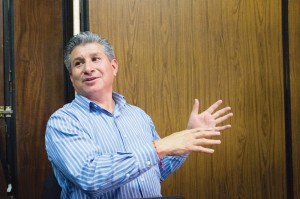
‘What would the United States gain from being constantly at war?’
The ongoing teachers strike in Mexico City is a mass protest against national education reforms that would hardly cause U.S. citizens to bat an eye. But critics say Peña Nieto’s proposals have more to do with privatization than actually improving schools. And his government has tried to enforce its will against protesters with violent police crackdowns.
Isaías Jaime Ignacio Cruz sees similarities between Trump’s rhetoric and the reality in Mexico: “Here, too, our government has already become very right-wing. It has become more discriminatory, and it’s affecting its own population.”
A teacher from Oaxaca, Ignacio has been part of the teacher occupation in Mexico City since 2013. He said that what makes Trump worse than most is that “he is a person who discriminates too much and that, in fact, he is racist toward certain groups.”
Ignacio predicted that the U.S. economy would collapse if undocumented immigrants were prevented from entering the country or sent back to Latin America. “They have jobs that Americans cannot or will not do,” he said.
He added that U.S. business owners ultimately benefit from undocumented immigration, since those without legal status will often work for less money.
He wonders what supporters think they will gain from Trump’s belligerent policy: “We’ve already seen this gentleman’s intentions to begin cutting ties with all of the developing nations. What would the [United States] gain from being constantly at war?”
Hopefully, he said, Americans will come to their senses by November. He quoted Benito Juarez, the first indigenous president of Mexico: “Respect for the rights of others means peace.”
‘God help us!’
Jose Luis Diaz Calderón described Trump frankly: “Nosotros la vemos como si fuera algo muy parecido a Hitler.” To translate: We see it as something very much like Hitler.
But the professor at Instituto Politécnico Nacional, a public university with several campuses in Mexico City, also thinks that Trump’s bark will be louder than his bite if he’s actually elected president.

“It’s understood that, in a campaign, [Trump] can say a thousand things to win votes,” he explained. But if Trump wanted to pursue a hard line with Mexico, his influence would be limited by pre-existing agreements between the two governments, the counterweight of the U.S. Congress, and state laws along the border.
Diaz also believes that Mexico’s significance as a leading country in Latin America would temper some of Trump’s more extreme proposals. “We say that, in terms of Latin America, Mexico represents the big brother for the majority of countries, with the exception more recently of Brazil, Chile, or Argentina,” the professor explained.
He wants to remind readers that Mexico has been the United States’ partner for 150 years. This means that, Diaz believes, his country is an essential intermediary between the United States and other Latin American nations. In other words, Trump would need Mexico.
Mexico also has deep economic ties to the United States. Not only do U.S.-based firms use cheap Mexican labor, but Mexico, with roughly 120 million residents, represents an important consumer market. (Think: “Mexican Coke.”)
But Diaz also stressed that most voters in Latin America admire U.S. elections as clean and free from repression or corruption. At the same time, he thinks that, in the United States, Latino voters are undervalued as a complementary bloc to white voters and that their interests are too often overlooked. Trump’s pandering to the concerns of an ever-insecure, mostly conservative base supports Diaz’s view.
And that’s the rub in Mexico: “For us, the worst thing is that there’s a mass [of people] that support the proposals of Donald Trump. Today, if you ask any Mexican, they’ll say, ‘God willing, Hillary Clinton will win.’ ”
Interestingly, this anti-Trump sentiment is shared across the political aisle in Mexico, from supporters of the conservative Peña Nieto to those who sympathize with the striking teachers. They’re all saying it:
“‘God help us if Donald Trump wins!’”
A version of this story originally appeared in the East Bay Express.











